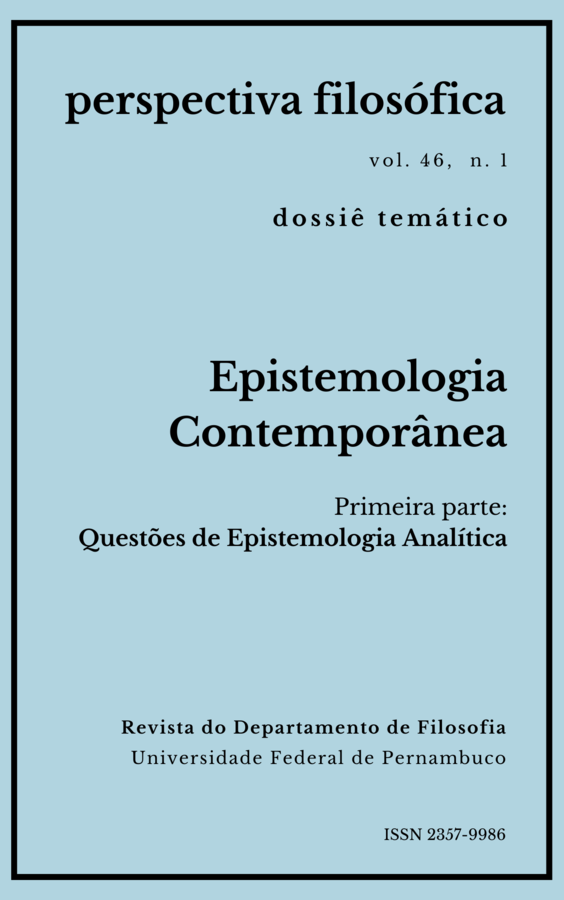Ética da crença, fake news e responsabilidade
DOI:
https://doi.org/10.51359/2357-9986.2019.247946Keywords:
ethics of belief, epistemic normativity, epistemic vices, epistemic responsibilities, fake newsAbstract
This paper aims to discuss the ethics of belief and the relationship between epistemic responsibility and moral responsibility, in order to apply the discussion to the evaluation of cases involving the use of social media to obtain fake news and share them. To achieve this goal, I will first discuss the norms of Clifford's ethics of belief in the first section, and thus, in the second section, criticize the idea of the correlation between epistemic and moral responsibility advocated by Clifford. In the third section I will present Cassam's theory of epistemic vices, so that, in the final section, evaluate cases involving fake news and social media from the perspective of epistemic vices. I will close the paper with a brief discussion of the risks of proposing laws that seek to criminalize fake news without proper discussion.References
BATTALY, Heather. Epistemic Virtue and Vice: Reliabilism,Responsibilism, and Personalism, In MI, Chienkuo; SLOTE, Michael eSOSA, Ernest (eds). Moral and Intellectual Virtues in Western and ChinesePhilosophy. New York: Routledge. 2016.
CASSAM, Quassim. Epistemic Insouciance. Journal of PhilosophicalResearch, v. 43. 2018.
CASSAM, Quassim. Vices of the Mind: from the intellectual to the political.Oxford: Oxford University Press. 2019.
CLIFFORD, William. A Ética da Crença. In MURCHO, D. (ed.). A Ética daCrença. Lisboa: Editora Bizâncio. 2010.
COUTINHO, Emílio. Escola Base: Onde e como estão os protagonistas do maior crime da imprensa brasileira. São Paulo: Editora Casa Flutuante.2016.CRAIG, Edward. Knowledge and the state of nature: an essay in conceptualsynthesis. Oxford: Claredon Press. 1990.
FRANKFURT, Harry. Sobre Falar Merda. Rio de Janeiro: Editora IntrínsecaLtda. 2005.
GRECO, John. Achieving Knowledge: A Virtue-theoretic Account ofEpistemic Normativity. Cambridge: Cambridge University Press. 2010.
HAACK, Susan. ‘The Ethics of Belief’ Reconsidered. In STEUP, Matthias(ed). Knowledge, Truth, and Duty. Oxford: Oxford University Press. 2001.
KURZBAN, Robert. Why everyone (else) is a hypocrite. Evolution and themodular mind. Princenton: Princenton University Press. 2010.
MATTHESON, Jonathan; VITZ, Rico. The Ethics of Belief. Oxford: OxfordUniversity Press. 2014.
MARSILI, Neri. Retweeting: its linguistic and epistemic value. Synthese.Publicado online em 29 jun 2020.
ORESKES, Naomi; CONWAY, Erik. Merchants of Doubt: How a Handfulof Scientists Obscured the Truth on Issues from Tobacco Smoke to GlobalWarming. New York: Bloomsbury Publishing. 2010.OXFORD, Dicionário. 2020. Disponível emhttps://dictionary.cambridge.org/us/dictionary/english/fake-news. Acesso em 25 jun 2020.
PEELS, Rik. Perspectives on Ignorance from Moral and Social Philosophy.New York: Routledge. 2017.
SOSA, Ernest. Judgment and Agency, Oxford: Oxford University Press.2015.
STEUP, Matthias (ed). Knowledge, Truth, and Duty. Oxford: OxfordUniversity Press. 2001.
SCHWARTZ, Barry. O paradox da escolha: Por que menos é mais. SãoPaulo: Editora a Girafa. 2004.
WOOLLEY, Samuel C.; HOWARD, Philip N. Computational Propaganda:political parties, politicians, and political manipulation on social media.Oxford: Oxford University Press. 2019.
ZAGZEBSKI, Linda. Virtues of the Mind: An Inquiry into the Nature ofVirtue and the Ethical Foundations of Knowledge. Cambridge: CambridgeUniversity Press. 1996.
Downloads
Published
Issue
Section
License
A Revista Perspectiva Filosófica orienta seus procedimentos de gestão de artigos conforme as diretrizes básicas formuladas pelo Conselho Nacional de Desenvolvimento Científico e Tecnológico (CNPq). http://www.cnpq.br/web/guest/diretrizesAutores que publicam nesta revista concordam com os seguintes termos:
Os autores mantém os direitos autorais e concedem à revista o direito de primeira publicação, sendo o trabalho simultaneamente licenciado sob https://creativecommons.org/licenses/by/4.0/deed.pt_BR que permite o compartilhamento do trabalho com reconhecimento da autoria e publicação inicial nesta revista.
Os autores têm autorização para assumir contratos adicionais separadamente, para distribuição não-exclusiva da versão do trabalho publicada nesta revista, com reconhecimento de autoria e publicação inicial nesta revista (Consultar http://opcit.eprints.org/oacitation-biblio.html).

Esta revista está licenciada com uma Licença Creative Commons Atribuição 4.0 Internacional.













